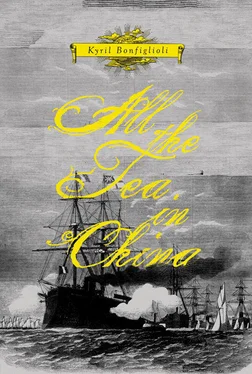“I shall make an entry in the log that I have reprimanded you, Sir.”
“Aye aye, Sir,” said Peter. The words were commonplace but they fell slowly from his lips like a curse, or perhaps a challenge.
The Captain ignored his insubordinate tone and turned on his heel; as he entered his cabin I heard him say “Blanche!”
“What in the name of God …?” I began to say.
“Go forrard, Karli, go forrard,” said Peter in a choked voice.
I jostled my way to the bows through the throng of men who had been ordered below. Over on the starboard bow there was a great glow in the sky — I could not tell how far off. Peter was at my elbow although, having the watch, he should have been aft.
“That ‘may or may not be’,” he said bitterly, “the Martha Washington. Go to bed, Karli.”
“But …”
“No , Karli. Go to bed.”
I stirred in my sleep at the sound of the great anchors being weighed at first light and at the thunder and rush of bare feet on the deck above me as sail was made and set. I slept again until Orace brought me my morning drink: bitter coffee sweetened only, with rum, for the cow had died some days before. I huddled on some clothes and went on deck. The whole ship’s company, it seemed, was staring and peering at the breakers smashing and creaming on the reef outside a low-lying island. There was nothing to see.
Then, a bellow from the look-out: “Object one point on the port bow! Piece of flotsam and what looks like a corpus, Sir!”
The Captain, who had been staring fixedly aft, received this news from the Second Mate, who had the watch. He did not look up.
“Do your duty,” he said, “take in sail, lower a boat, you know what to do, you have an Extra Master’s ticket, I believe.” He said it as though an Extra Master’s Certificate was a token for a soup-kitchen.
Within ten minutes a half-charred timber was gently swayed aboard with a shockingly charred human being adhering to it — whether lashed to it or clinging by some primal rigour it was hard to say.
The man was alive; that is to say, he was not dead. One of our fellows cried his name as “Jack Cherry of Salem!” and the man’s face split in what may well have been a smile. They brought him to the break of the poop and the Captain, for he was a Christian, came to look; bent down and asked, “What ship are you from, my man?”
The charred man eyed him with his left eye — the unroasted one — then raised himself with infinite difficulty on one elbow. A horrible noise came from his chest — I thought it was the death-rattle, but he was only gathering phlegm — then he spat full in the Captain’s face.
Bully Lubbock reached to the back of his belt for his rope’s end “starter” but the Captain checked him with a gesture.
“You’ll not lay a finger on this man!” he cried. “Have him taken to an officer’s cabin and see that the doctor and the loblolly-boy give him the best of food and care, for he is a brave fellow.” He reached behind him for the napkin, which his Chinese servant had ready, and wiped the mucus from his face.
“When he is well he may sign with us at one rating higher than on his — ah — last ship” (he could not name the Martha Washington) “or we shall put him ashore at any place he chooses between Pondicherry and Calcutta with five golden guineas in his pocket. See to it, Mister.”
They carried the man away with the tenderness which only coarse, rough men know how to exercise towards their mates. When he had gone, I looked up and saw Blanche smiling her enigmatic smile at me. That I found disgusting.
The Captain’s charity and forbearance cost him little in guineas for the man died that very evening. Next morning he was sewn up in tarpaulin with a forty-pound lump of pig-iron ballast at his foot and the sailmaker, at the end, passed the ritual last stitch through his nose, lest he were not quite dead. The Captain, despite his desperate lust for making sea-miles had the ship hove-to and the yards cock-billed and read the Service with some colour of sincerity. The sail-maker had cobbled up a Yankee flag and the canvas parcel slid out from under it in quite the proper fashion. But the men, I noticed, were not watching the committal to the deep; their eyes were on the Captain. I looked at Peter but could not catch his eye. I looked at the Second: he looked in my direction, certainly, but his eyes were fixed on something quite one hundred miles away. I detected an uncomfortable feeling throughout the ship’s company. Even the Doctor, who, being but a black man, could not attend a Christian burial — if that is what it was — lurked plainly to be seen in the entrance of his galley and his big, red lips, which I had never before seen without a grin upon them, were pursed and puckered into an expression which I could not read at all.
That evening I was loafing on the quarterdeck and trying to draw the taciturn Second into conversation.
“Why,” I asked pettishly after exchanging a few commonplaces, “are my toes so sore? I have never suffered from soreness of the toes in my life.”
“Sleep in socks or sea-boots,” he said and crossed to the weather-rail. Baffled, I followed him.
“I confess I do not understand,” I said meekly. He did not turn his head but gave me a sidelong stare with his pale eyes. He was a sidelong sort of man.
“Cockroaches,” he said. “They love the hard skin on a man’s feet but, after a few days at sea, you’re thoroughly pedicured and must protect your feet or the little buggers will munch their way up to your ankles.”
I digested this revolting fact, then, since this was almost the longest sentence I had ever heard him utter, I was emboldened to confide that I was not wholly clear about the events of the previous night. Again he gave me that pallid stare; clearly, he was deciding whether to answer me or not. Finally he said,
“Mr Van Cleef, do you know what a vigia is?”
“No,” I said unhesitatingly, because this was true.
“It is a mark on a map. A Portugee word, meaning ‘watch out’. The Frogs call it an ‘ouvre l’oeil’ , which amounts to the same thing. It means that there’s a reef or shoal or some other hazard — or at least that the master of some ship, some time, has fancied that he’s seen something of the sort. Nine times out of ten it was just a dead whale or a raffle of unsunk wreckage or the sea breaking on some heavy-heeled floating spar; further south it may have been the last of a ’berg; off the West Coast of Africa just a floating island that some river has spewed out. Often as not it’s just the effect of too much rum.” He fell silent. I prompted him, asking why these interesting facts were connected with what I wanted to know. He heaved a deep, patient breath.
“Our Captain,” he said, “has a passion for these waters we are in; his charts are a mass of pencilled-in vigias — you may have observed this morning that he was tacking about like a spaniel in a turnip-field. Captain Cattermole — the late Captain Cattermole we must now call him — was a dashing young man who believed in nothing but survey-proven shoals on clean charts. Also, he believed that he could follow where Captain Knatchbull led. Furthermore, as you must have noticed, Captain Knatchbull was not, in fact, leading. R.I.P.”
“I have the impression,” I said carefully, “that Captain Cattermole was a well-liked man …?” But I had pushed too far.
“Mr Van Cleef, I have the watch and must ask you to delight me with your conversation at some time when the safety and the working of the ship are not in my hands. If you wish to hear an encomium on Captain Cattermole I suggest you offer a glass of spirits to O’Casey, the red-haired top-man, who sailed with him through three voyages. His watch is below and he will have eaten by now. Indeed, that is the fellow, there, lounging with his pipe in the lee of the foremast-bitts. Goodnight.”
Читать дальше












